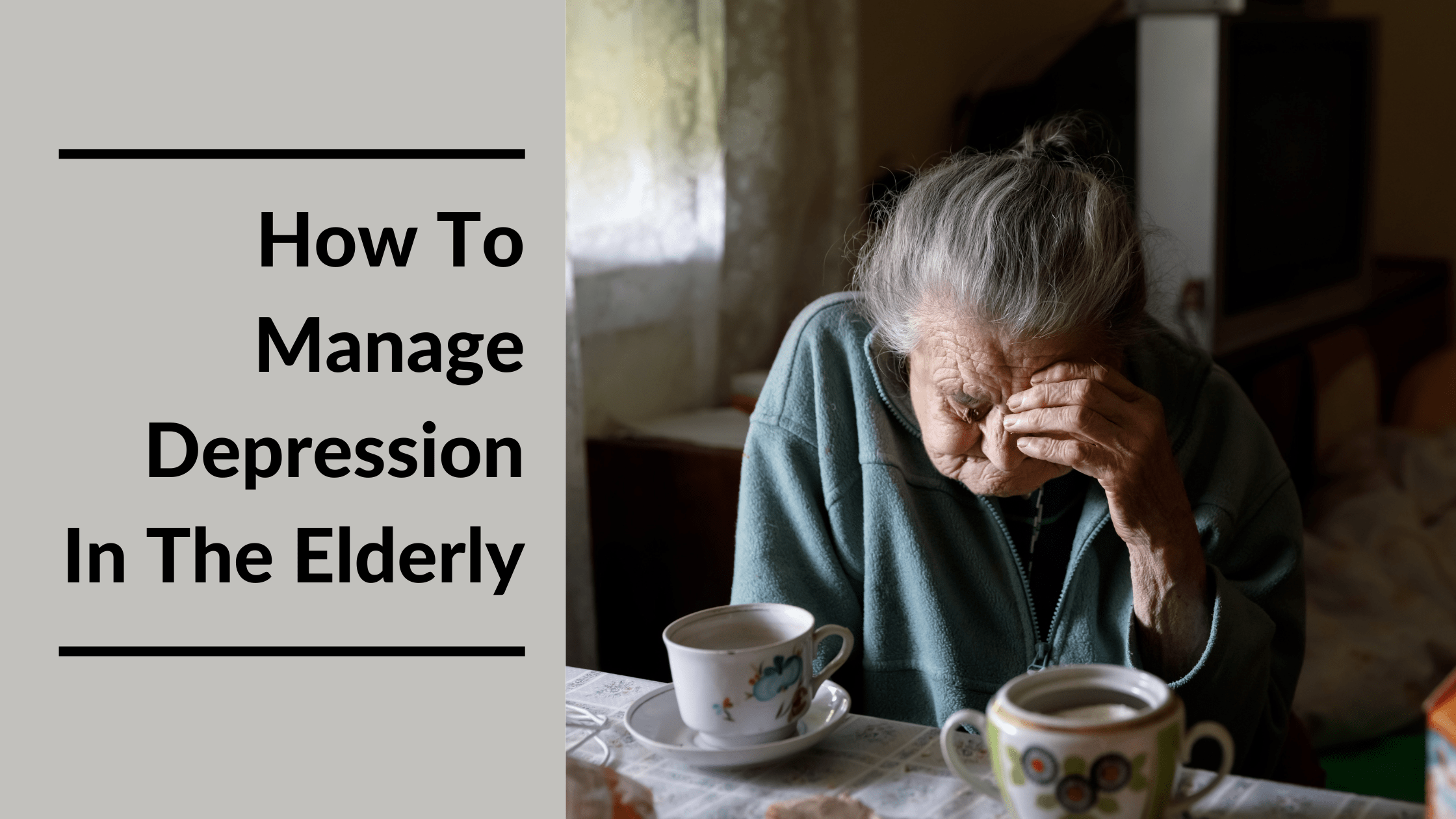
Depression in the elderly creates several challenges for both seniors & caregivers. Learn more about this issue & how to support a loved one today.
Updated February 8, 2023
Depression In The Elderly Affects Everyone
Depression in the elderly can create many challenges for both seniors and caregivers. For example, older adults with depression are more likely to suffer cardiac disease or experience memory loss. These and other conditions contribute to caregivers’ responsibilities and increase their risk of burnout.
In the US, nearly 6 million adults over 65 have depression, yet just 10% seek treatment and support. Depression can happen to anyone, even those who have never struggled with depressive symptoms.
If an older adult develops depressive symptoms, it’s crucial to address them as soon as possible. With time, patience, and support, it’s possible to get better and move forward with renewed energy and happiness.
Symptoms Of Depression In The Elderly
People with depression may not experience feelings of sadness. Depression has many faces, and it can be difficult to recognize someone who struggles with it.
Recognizing depression in the elderly can be challenging because many don’t report feeling sadness, a common sign. However, depression manifests differently than in other age groups. Instead, they often experience low motivation, energy, and physical problems like headaches and arthritis. For this reason, it’s important to recognize symptoms of depression, such as:
- Sadness
- Memory problems
- Slower speech and movements
- Decreased appetite or weight loss
- Above-normal alcohol or drug use
- Focusing on death or thoughts of suicide
- Diminished interest in social activities or hobbies
- Feelings of despair, hopelessness, or helplessness
- Aches and pains that worsen or appear suddenly or without cause
- Poor self-care (missing meals, not taking medicine, or poor hygiene)
- Feelings of decreased self-worth (feeling like a burden, worthless, or self-loathing)
- Sleep problems (difficulty falling asleep or sleeping through the night, sleeping too much, or feeling tired during the day)
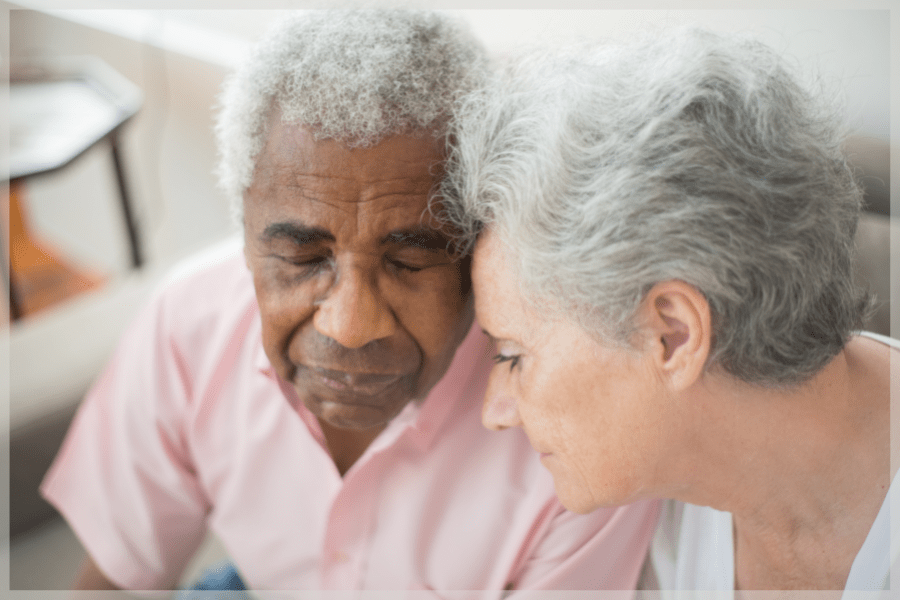
Causes Of Depression In The Elderly
Aging brings many changes, and some may be more difficult than others. It’s normal to feel “down” or “blue” during these experiences. Later-in-life changes, such as moving from home to a facility, are often the root causes of depression in the elderly.
Here are a few common causes of depression in the elderly.
Health Changes
Depression affects 1% to 5% of seniors who live in their communities but 13.5% of those who need home healthcare.
Illness, disability, pain, mental decline, surgeries, and other health changes can cause significant distress and impact seniors’ quality of life. Health problems can also trigger depression in the elderly through psychological reactions and physical challenges.
Social Isolation
Social isolation and loneliness are significant factors in depression among seniors who may not be able to get around as much or whose social circle is shrinking.
A Lack Of Purpose
Reduced mobility or other limitations can leave seniors dependent on others and unable to participate in things they could before. They may also struggle with their identity as they cope with new situations.
Fear And Anxiety
Uncertainty about finances, health, independence, or death can create severe emotional and mental distress.
Loss
Losing a spouse, friend, or other loved one can be traumatic. Sadly, a loss can occur more often as people age, increasing the risk of depression.
Certain Medicines
Some medications can also cause symptoms of depression, so review the side effects of any prescriptions and discuss any changes with a healthcare professional.
Challenges In Addressing Depression In The Elderly
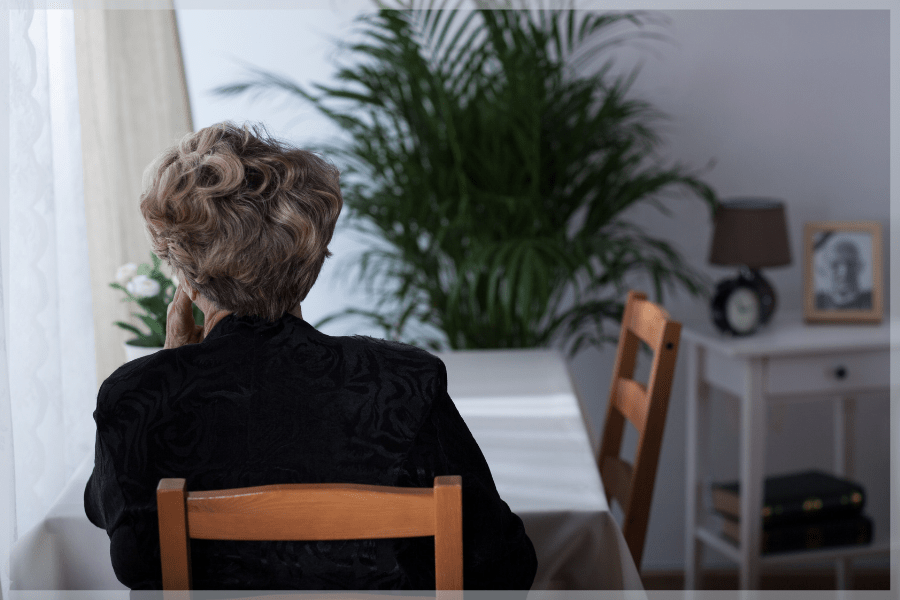
Recognizing, understanding, and treating depression in the elderly can be difficult for several reasons. Learning about internal and external pressures facing seniors’ mental health can make it easier to talk to them about their symptoms and begin finding help.
Limited Understanding Of Depression
Many seniors may not recognize the symptoms of depression or mistake them for something else. Similarly, they may assume they’re “just down in the dumps” and associate these depressive feelings with aging. This was highlighted in a 2017 study of Baby Boomers, Generation X, and Millenials, which found that seniors were the least likely to accurately self-assess their symptoms.
Generational Stigma Toward Mental Health
Seniors may also be reluctant to admit or discuss these issues due to generational attitudes toward those with mental illnesses, causing some to ignore treatment completely.
Social Isolation
Social isolation and loneliness are major obstacles in addressing depression in the elderly. In addition to contributing to or worsening depressive symptoms, isolated or lonely seniors may have no one to notice their declining mental health or talk to about their struggles.
How To Manage Depression In The Elderly
Besides seeking professional help, there are several ways to treat depression in the elderly. It’s never too late to make the necessary lifestyle changes to improve your quality of life dramatically.
Of course, depression makes motivation feel nonexistent. Consequently, finding the desire or energy for the littlest things can feel overwhelming. But it’s important to know that doing just one small thing every day can become the stepping stone to improving mental health. It doesn’t have to start with learning a new hobby. It can be as simple as a short walk to release some endorphins.
Here are some ways to manage depression in the elderly.
Stay Connected
Phone calls, e-mail, and social media are great for staying in touch with those you care about when you can’t socialize in person. Just try not to make that your only means of communication, as it isn’t a replacement for human interaction.
Get Out Of The House
Senior social isolation can lead to worsening symptoms, so getting out of the house is critical to improving your mental health. Even if you live away from friends and family, it’s crucial to maintain a healthy social life as an adult. Doing what you can to get support will help you feel more connected to others and stop feelings of loneliness. Here are a few ideas:
Explore Your Community
Visiting a new cafe, sitting in a park on a beautiful day, getting your nails or hair done, or going to a museum are good things to do outside.
Get Involved
If you don’t know how to meet people, consider volunteering. Helping others will make you feel good, improve your self-esteem, and build a sense of purpose. You could also join a senior center or enroll in local classes to learn a new skill or interest.
Join Support Groups
Consider finding a nearby support group focusing on depression in the elderly. You’ll get to know others dealing with similar problems and learn new ways to cope.
Adopt A Pet
If your situation allows for it, consider adopting a pet. Pet ownership can help build your purpose and provide companionship. In addition, many types of dogs are excellent companions for most seniors, and you’ll have an easy way to meet others at dog parks or on walks.
Find Purpose
Growing older doesn’t mean you must stop looking for meaning in your life. In fact, a big part of overcoming depression is finding your purpose, whatever it may be.
There are plenty of opportunities to find yourself and improve your wellbeing. When life brings its changes, for better or worse, it’s just an opportunity to fill that opening with something new.
Volunteer
Meeting new people is one of many advantages of joining a class or volunteering. It’s also a chance to use your skills constructively while benefiting others. You also have the opportunity to learn new skills and do something you’ve always wanted to do.
Make A List
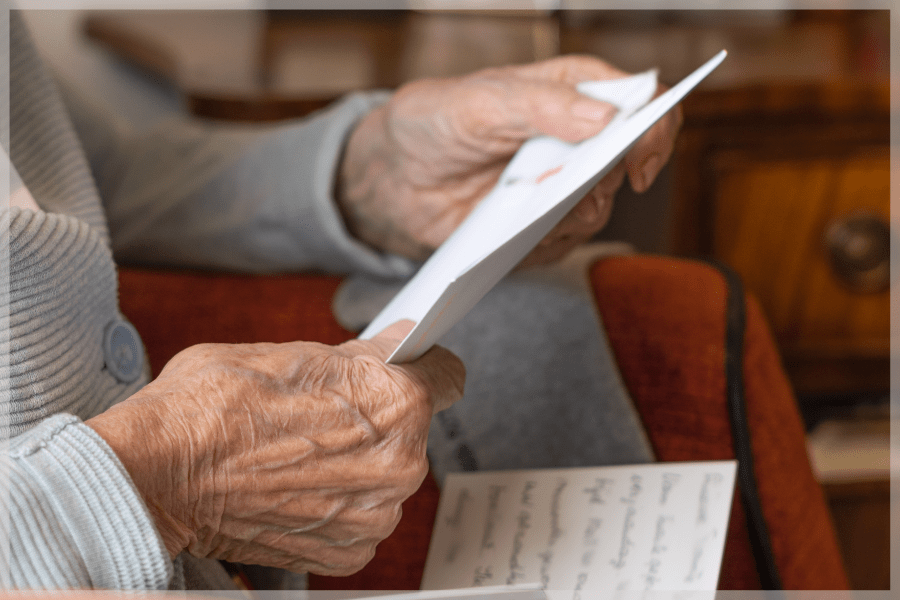
Depression makes it easy to slip into a cycle of negative thinking about your capabilities. So rather than look at what you’ve accomplished in the past, concentrate on your present abilities. Make a list to remind yourself of everything that makes you great.
Learn Something New
Retirement offers you a lot of free time, so you can fill it with the things you never had the time to learn. Plus, learning has the added benefit of boosting cognitive functions and slowing cognitive decline.
Travel
New scenery can refresh you mentally and help you feel more invigorated. It doesn’t have to be somewhere expensive or exotic, either. There are plenty of senior travel destinations for a week (or weekend) of fun.
Practice Self-Care
Staying on top of hygiene and putting in the effort to maintain your appearance isn’t vain or superficial. On the contrary, it’s proven to boost self-confidence and how you feel about yourself.
Take Care Of Your Body
You can’t neglect your physical wellbeing as you work to improve your mental health. So here are four ways to care for your physical health.
Improve Sleep Quality
It’s easier to fight depression when you’re rested, so make sure you get a good night’s rest. Aim for seven to nine hours of quality rest every night. If you struggle with sleep problems, try to improve your sleep hygiene by avoiding alcohol and drinking caffeine late in the day. These substances can disrupt the REM cycle and leave you feeling unrested in the morning.
Another way to improve sleep hygiene is to dedicate your bedroom solely to sleep. Doing so trains the mind and body to associate the bedroom with rest and helps you wind down once you get into bed. In addition, stay consistent about the times you go to sleep and when you wake up so you can balance your circadian rhythm.
Get Enough Sunlight
Try to get at least 15 minutes of sunlight daily. It improves serotonin levels, and your body will absorb vitamin D, which helps regulate mood. When sunlight is minimal in winter, consider purchasing a light therapy box to ward off Seasonal Affective Disorder.
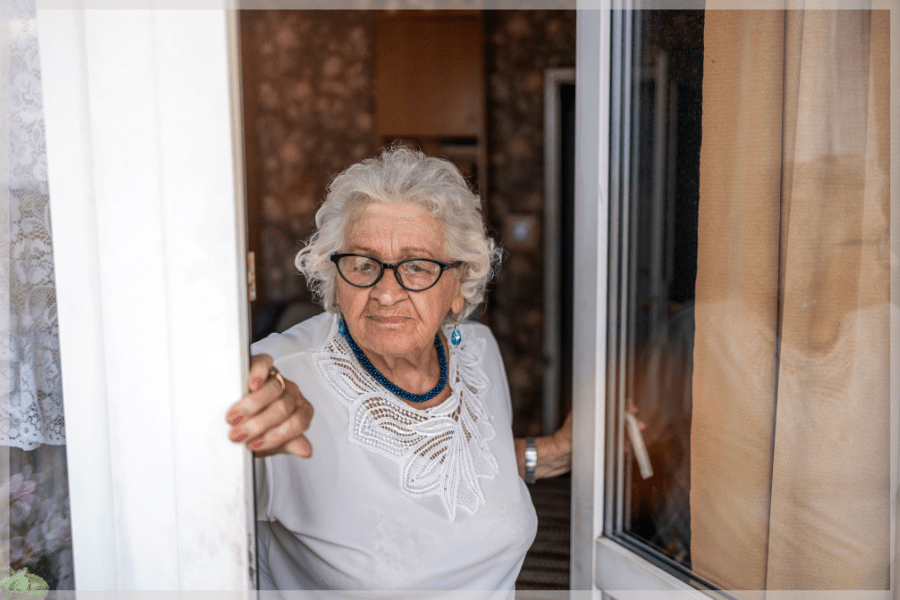
Exercise
The importance of physical activity can’t be understated. Although it can be tricky for those with limited mobility to get active, seniors can try many indoor exercises at home.
Studies have shown that physical activity can be beneficial for improving mental health as medication. Even a short walk can be just what your body needs to start feeling body.
Over time, a sedentary lifestyle can make mobility more challenging, so getting around more often will lead to small improvements the more you do it.
Eat Nutritious Foods
Eating right can also do wonders for depression in the elderly. Sugar causes many problems, especially inflammation, which can cause pain and mobility issues. It’s best to avoid refined carbs and eat more whole foods high in fiber, healthy fats, and protein.
Seek Professional Help
Therapy, combined with prescription medication, could potentially help with many symptoms of depression. However, it’s important not to rely on prescriptions or use them to mask underlying problems such as senior social isolation or other issues. Antidepressants have higher risk factors for the elderly, so monitoring doses and ensuring safety is important.
Support counseling, individual therapy, and peer counseling are three ways to make talking about depression easier. It also discusses the root problems causing a decline in mental health instead of only dealing with symptoms.
Recognizing The Difference Between Grief And Depression In The Elderly
Most people have experienced grief due to a loss, from a job to a loved one. But aging adults can experience other losses that can be difficult to cope with, such as their independence, mobility, or their health.
Grieving is normal, and there are healthy ways to express it. It might be difficult, however, to tell the difference between grief and depression. For example, during the grieving process, an individual may undergo periods of both happiness and sadness. In other words, you may still have moments when you feel pleasure despite the sadness.
On the other hand, people with depression often struggle with chronic feelings of emptiness or hopelessness, making it challenging to feel enjoyment or pleasure. Over time, they may lose the ability to enjoy anything completely.
How Caregivers Can Manage Depression In The Elderly
Understand that mental health was widely stigmatized when Baby Boomers were young. As a result, your loved one may not want to talk about it or admit they are depressed. However, you can still help by being there for them and offering emotional support.
If they do talk to you about their feelings, listen, and hear what they are trying to say. Your patience and compassion will go a long way to helping them feel heard. Also, remember that their mental health isn’t your job to fix. But you can work with your loved one to find a diagnosis and treatment. If possible, go with them to appointments and research ways you can help someone struggling with depression.
Some other ways you can help include finding ways to stimulate their bodies and minds. Invite them with you on outings, such as a walk or a movie. Insist that they join you in social activities, reminding them that they’ll feel better by being around other people for a couple of hours. Help them with meal prep and planning so they can eat healthier throughout the week when you aren’t there to help.
If your loved one starts treatment, motivate them to continue it, so they don’t relapse. But, most importantly, watch for the warning signs of suicide and get professional help immediately.
MeetCaregivers Can Help
Depression in the elderly presents many unique challenges, especially if you aren’t around to help as much as you’d like. For example, consider hiring a caregiver if your loved one regularly forgets to take their medicine, needs transportation assistance to appointments, or needs help with routine tasks.
MeetCaregivers has many qualified in-home care workers who can meet your loved one’s needs. We’ll work with you to find the right match and ensure peace of mind so you can focus on helping your loved one improve.
Call 1 (888) 541-1136 or get started online and find a caregiver today.
Check out the Blog for more resources and articles to support seniors’ and caregivers’ wellbeing and health.
- Avera, A. M. (2019, June 8). (thesis). Differences in Mental Health Education Across Baby Boomers, Generation X, and Millennials. Digital Commons@Georgia Southern. Retrieved September 23, 2019, from https://digitalcommons.georgiasouthern.edu/honors-theses/294.
- Brett, G. (2012). The stigma of mental illness : generational differences, help seeking behaviours and quality of life. Retrieved September 23, 2019, from https://www.semanticscholar.org/paper/The-stigma-of-mental-illness-%3A-generational-help-of-Brett/a2ca2a2f62bf05429744f21f30e7b4478de667b3?p2df
- Centers for Disease Control and Prevention. (2018, February 16). Depression is Not a Normal Part of Growing Older. Depression is Not a Normal Part of Growing Older – CDC. Retrieved January 18, 2023, from https://www.cdc.gov/aging/depression/index.html
- Fulghum Bruce, D. (n.d.). Depression in Older People. Depression in Older People: Symptoms, Causes, Treatments. Retrieved September 23, 2019, from https://www.webmd.com/depression/guide/depression-elderly#1 Updated October 13, 2022. Medically reviewed by Jennifer Casarella, MD, on September 4, 2022
- Netz Y. (2017). Is the Comparison between Exercise and Pharmacologic Treatment of Depression in the Clinical Practice Guideline of the American College of Physicians Evidence-Based?. Frontiers in pharmacology, 8, 257. https://doi.org/10.3389/fphar.2017.00257. Retrieved September 23, 2019, from https://www.ncbi.nlm.nih.gov/pmc/articles/PMC5430071/
- National Institute on Aging. (n.d.). Depression and Older Adults. Depression and Older Adults | National Institute on Aging. Retrieved September 23, 2019, from https://www.nia.nih.gov/health/depression-and-older-adults. Reviewed July 1, 2021
- Robinson, L., Smith, M., & Segal, J. (n.d.). Depression in Older Adults: Signs, Symptoms, Treatment. Depression in Older Adults – HelpGuide.org. Retrieved September 23, 2019, from https://www.helpguide.org/articles/depression/depression-in-older-adults.htm Updated December 30, 2022
